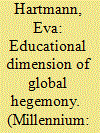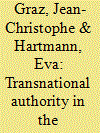| Srl | Item |
| 1 |
ID:
141217


|
|
|
|
|
| Summary/Abstract |
This article seeks to further strengthen a sociological turn within International Relations (IR), which aims to make classical social theory fruitful for analysing the transnationalisation of societies. The focus is on the contribution of Antonio Gramsci’s analysis in this regard. A number of scholars have transferred his theory of hegemony to the global level in order to gain a more sophisticated understanding of global power and its transformation in reaction to the deepening of global economic integration. Surprisingly, most neo-Gramscian scholars have devoted little attention to education, despite the importance Gramsci assigned to this social sphere. The article seeks to overcome this lacuna with a study of the internationalisation of higher education since the end of the Second World War. Against the backdrop of the insights this case study provides, it will suggest some modifications of the neo-Gramscian account of hegemony with a view to taking the sociological turn more seriously, and to deepening our understanding of the social quality and the scale of the emerging postnational hegemony.
|
|
|
|
|
|
|
|
|
|
|
|
|
|
|
|
| 2 |
ID:
118135


|
|
|
|
|
| Publication |
2012.
|
| Summary/Abstract |
This article examines the extent and limits of nonstate forms of authority in international relations. It analyzes how the information and communication technology (ICT) infrastructure for the tradability of services in a global knowledge-based economy relies on informal regulatory practices for the adjustment of ICT-related skills. By focusing on the challenge that highly volatile and short-lived cycles of demands for this type of knowledge pose for ensuring the right qualification of the labor force, the article explores how companies and associations provide training and certification programs as part of a growing market for educational services setting their own standards. The existing literature on non-conventional forms of authority in the global political economy has emphasized that the consent of actors, subject to informal rules and some form of state support, remains crucial for the effectiveness of those new forms of power. However, analyses based on a limited sample of actors tend toward a narrow understanding of the issues concerned and fail to fully explore the differentiated space in which nonstate authority is emerging. This article develops a three-dimensional analytical framework that brings together the scope of the issues involved, the range of nonstate actors concerned, and the spatial scope of their authority. The empirical findings highlight the limits of these new forms of nonstate authority and shed light on the role of the state and international governmental organizations in this new context.
|
|
|
|
|
|
|
|
|
|
|
|
|
|
|
|